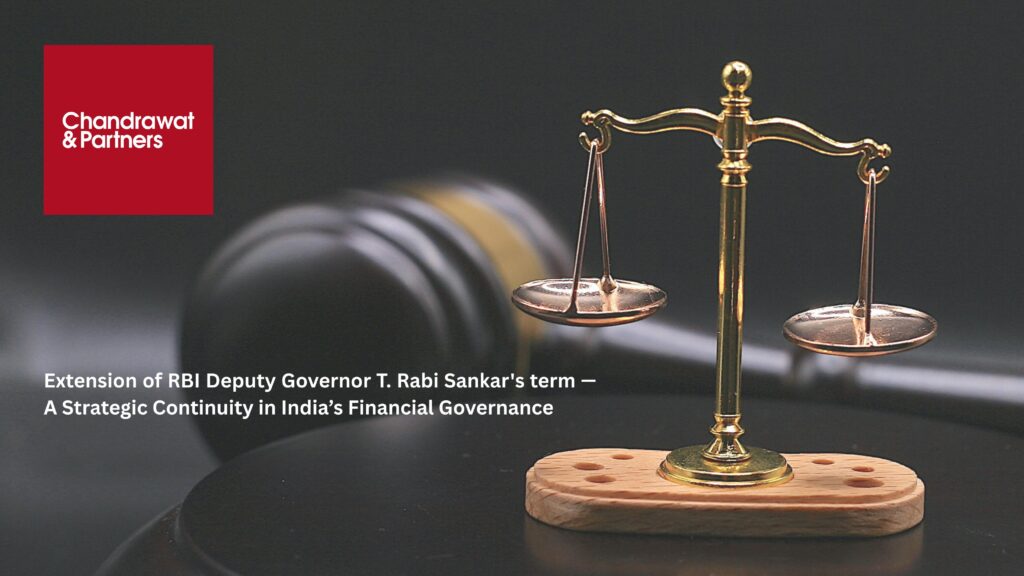Home > Recent Judgements > Extension of RBI Deputy Governor T. Rabi Sankar’s term — A Strategic Continuity in India’s Financial Governance
April 23, 2025
Extension of RBI Deputy Governor T. Rabi Sankar’s term — A Strategic Continuity in India’s Financial Governance
Introduction
The Government of India announced the extension of the term of Reserve Bank of India (RBI) Deputy Governor – T. Rabi Sankar by one-year, effective May 3rd, 2025. This decision, while administrative on the surface, carries profound implications for India’s financial markets, central banking stability, and broader macroeconomic governance.
In this blog, we will explore the legal, institutional, and strategic significance of this extension, the role and influence of Deputy Governors in the RBI, and what this development signals for India’s economic trajectory in 2025–26.
Who is T. Rabi Sankar?
- Rabi Sankar is a senior central banker with over three decades of experience at the Reserve Bank of India. Prior to his elevation as Deputy Governor in 2021, he held key positions including:
- Executive Director at the RBI
- Head of the Department of External Investments and Operations (DEIO)
- Leadership roles in debt management, monetary operations, and digital currency studies
He is widely regarded for his expertise in foreign exchange management, digital currency research, and market regulation, having played a pivotal role in India’s exploration of a Central Bank Digital Currency (CBDC).
Legal Framework for Deputy Governors
Appointment and Term
The post of Deputy Governor is governed by the Reserve Bank of India Act, 1934. Under Section 8(1)(d) of the Act, the Central Government appoints Deputy Governors in consultation with the RBI Governor. There can be up to four Deputy Governors, each with a tenure not exceeding five years, including reappointments.
The current extension adds one year to T. Rabi Sankar’s initial term, reaffirming the government’s confidence in his stewardship.
Key Departments Under T. Rabi Sankar
As Deputy Governor, Sankar currently oversees some of the most sensitive departments in the RBI:
- Department of External Investments and Operations (DEIO) – Manages India’s foreign currency assets and oversees the investment strategy for foreign reserves.
- Financial Markets Operations Department (FMOD) – Executes RBI’s monetary policy decisions through market operations, including repo and reverse repo transactions.
- Department of Information Technology – Key for digital banking infrastructure and cybersecurity.
- Central Bank Digital Currency (CBDC) Division – Spearheading India’s digital rupee pilot and policy framework.
- Department of Government and Bank Accounts (DGBA) – Manages banking arrangements for the government and financial institutions.
This portfolio positions him at the heart of monetary policy execution, financial stability, and technological modernization of the central banking system.
Strategic Importance of the Extension
- Policy Continuity Amid Global Uncertainty
With the global economy still adjusting to inflationary pressures, geopolitical tensions, and digital transformation, Sankar’s continuation provides policy continuity in a volatile environment.
- Digital Rupee Rollout
India’s CBDC pilot, a landmark digital innovation in public finance, is progressing under Sankar’s leadership. His extension ensures the digital rupee rollout remains on track, with minimal disruption in regulatory development and inter-agency coordination.
- Forex and Market Operations Stability
With foreign capital flows fluctuating due to global interest rate dynamics, experienced leadership in foreign exchange management and open market operations become indispensable. Sankar’s domain knowledge in this area is a stabilizing factor for India’s external sector.
- Regulatory Oversight & Market Discipline
As Deputy Governor, Sankar plays a key role in shaping regulatory architecture for financial markets. His tenure extension is likely to reinforce investor confidence and institutional integrity in a time of evolving global benchmarks like Basel III and ESG-linked financing.
Implications for Financial Institutions and Legal Practitioners
Legal practitioners and compliance officers in banks, NBFCs, fintechs, and financial market intermediaries should take note of the following:
- Enhanced CBDC Regulations: Expect additional guidance and rules as the digital rupee expands in scope.
- Greater Forex Regulatory Clarity: New rules around external commercial borrowings, sovereign bond exposure, and currency futures may emerge.
- Reforms in Settlement Infrastructure: With RBI focusing on interoperable platforms, legal contracts related to settlement and clearing are expected to evolve.
Conclusion
The extension of T. Rabi Sankar’s tenure is more than just a bureaucratic continuation – it is a strategic affirmation of India’s ongoing financial reforms, particularly in the digital finance and market operations domain. As India seeks to consolidate its position as a stable and innovative economy, such appointments provide the institutional muscle needed to navigate the complex intersections of monetary policy, financial technology, and global economics.
For more information or queries, please email us at
enquiries@chandrawatpartners.com





